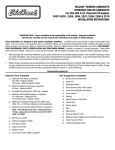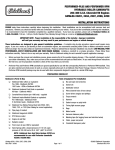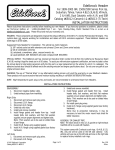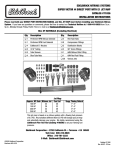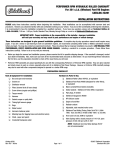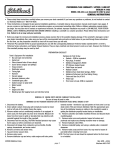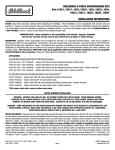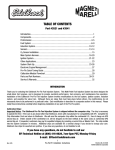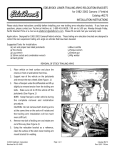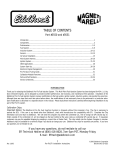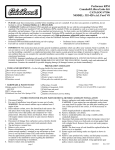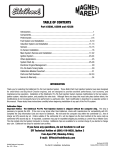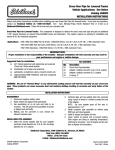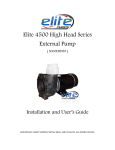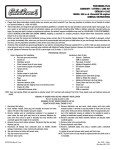Download 2201, 2204, 2205, 2207, 2208, 2209 & 2210
Transcript
ROLLING’ THUNDER CAMSHAFTS HYDRAULIC ROLLER CAMSHAFTS For 265-400 C.I.D. Chevrolet V8 Engines PART #2201, 2204, 2205, 2207, 2208, 2209 & 2210 INSTALLATION INSTRUCTIONS ® PLEASE study these instructions carefully before beginning this installation. Most installations can be accomplished with common tools and procedures. However, you should be familiar with and comfortable working on your vehicle. If you do not feel comfortable performing this installation, it is recommended to have the installation completed by a qualified mechanic. If you have any questions, please call our Technical Hotline at: 1-800-416-8628, 7:00 am - 5:00 pm, Pacific Standard Time. IMPORTANT NOTE: Proper installation is the responsibility of the installer. Improper installation will void your warranty and may result in poor performance and engine or vehicle damage. These instructions are designed to give general installation guidelines. A complete step-by-step procedure manual would require many pages. If you are a novice or just learning to work on automotive engines, we recommend consulting either Chilton or Motors automotive manuals before you begin. You may also contact an experienced mechanic. Please be advised that an improper installation may result in LOW MILEAGE, POOR PERFORMANCE, COSTLY REINSTALLATION AND EVEN ENGINE DAMAGE. Installing a camshaft is a complex procedure. Please follow these instructions carefully. Failure to do so may void your warranty. Refer to Edelbrock catalog for each camshaft’s specific application coverage. • Before you begin the removal and installation process, please examine the kit for possible shipping damage. If the camshaft is damaged, contact your dealer immediately. Also, make sure you have all the recommended tools and parts as listed below. As you read through these instructions the first time, use the preparation checklist to check off the exact items you will need. • Rolling’ Thunder camshafts are ground specifically for use with the corresponding Performer or Performer RPM manifold and cylinder heads. They are dyno-matched and street proven to work as a team; especially when part of an Edelbrock Total Power Package. However, Rolling’ Thunder camshaft package may also be used with other components designed to operate in a similar RPM range. PREPARATION CHECKLIST Hardware & Parts To Required Tools & Equipment For Installation q Box and Open End Wrenches q Edelbrock Roller Lifters or equivalent: Pre-1986 - Edelbrock #97383 1987-Later - OEM or Edelbrock #97384 q Socket Set q Distributor Wrench q Edelbrock Hardened Push Rods or equivalent: All Years - Edelbrock #9653 q Pliers (Channel Locks & Hose Clamp) q Camshaft Thrust Button (Pre-1986 Only) - supplied q Screw Drivers (Regular and Phillips) q Edelbrock Intake Manifold Gaskets or equivalent: Pre-1986 heads - Edelbrock #7201 E-Tec/Vortec heads - Edelbrock #7235 q Torque Wrench qHammer q Edelbrock True Rolling Timing Chain Set #7800, 7801, 7880, 7331, or 7332 (See Catalog for correct application) q Timing Light q Gasket Scraper or Putty Knife q Vacuum Gauge q Edelbrock Sure Seat Valve Springs #5845 or equivalaent NOTE: Valve Springs must have a closed pressure of 150 lbs., open pressure of 420 lbs. and a lift of .550” (.600” for #2207) qRags q Water Bucket q Harmonic Balancer Puller q Masking Tape (for tagging hoses and electrical wires) q Pipe Plugs, if needed q Chalk, Paper and Pencil q Edelbrock Gasgacinch #9300 q Crankshaft dampener puller q RTV Silicone Sealer q Engine Oil and Filter q Radiator Coolant q Front Cover Oil Seal, OEM or equivalent Part #2201, 2204, 2205, 2207, 2208, 2209 & 2210 Rev. 9/26/12 - QT/mc Page 1 of 4 ©2012 Edelbrock LLC Brochure #63-0154 IMPORTANT NOTES AFFECTING YOUR WARRANTY. PLEASE READ BEFORE CONTINUING THIS INSTALLATION! CAM LOBE DAMAGE: Cam lobe wear is almost non-existent unless mismatched parts are used or installation of the cam and lifters is installed improperly. Cam damage can result from the timing gear loosening due to improper torque on bolts. Bolts holding gear to camshaft should be torqued carefully and a locking compound applied to threads of bolts. Before installing your new hydraulic roller camshaft, check the gear drive on the distributor and oil pump for any signs of wear. If worn, be sure to replace with a new gear or you may wear out your camshaft prematurely. High-pressure oil pumps are not recommended with hydraulic roller camshafts. Edelbrock camshafts are designed for use with Edelbrock timing chains. VALVE SPRINGS (CAUTION REGARDING YOUR WARRANTY): In order for this Rolling’ Thunder roller cam to be covered under ANY WARRANTY, the correct Valve Springs MUST be used. Failure to install the correct valve springs may cause lifters to not follow the cam lobes and damage engine parts. This camshaft is designed to function with Valve Springs that have a closed pressure of 150 lbs, open pressure of 420 lbs and a lift of .550” (.600” for #2207). Edelbrock Sure Seat Valve Springs #5845 are highly recommended for these Rollin’ Thunder camshafts. Edelbrock #9736 Retainers are also highly recommended to insure proper spring installation height of 1.800”. Do not use rotator type valve springs or retainers for this application. LIFTERS: Edelbrock offers retro-fit roller lifters for pre-1986 engines, part #97383. Replacement OEM or Edelbrock #97384 lifters may be used in 1987 and later engines. To install your roller lifters, use fresh clean oil on the lifter and the lifter bore just prior to installing. Make sure to re-install the factory guide system (if equipped). The guide bar (high side of tappet) must face the opposite side of block. PUSHRODS AND ROCKER ARMS: Edelbrock #9653 pushrods, and high performance, roller rocker arms and studs are recommended for this installation. After the cam is installed and timed correctly (See Figure 2), it will be necessary to check for correct lifter preload. TIMING CHAIN: Use Edelbrock Performer-Plus Timing Set #7800 or 7802, Accu-Drive gear drive #7890, or Hex-A-Just Timing Set #7331 ONLY. Do not use late model timing chain and gear sets that are designed for emission-controlled engines. OEM timing sets are machined in a retarded position and are not recommended for this installation. CAM GEARS AND CAMSHAFT END PLAY: If cam gear becomes loose, the cam will slide back in the block, causing the lifters to hit the lobes next to them and also the cam bearing journals. If the engine is run after this happens, the bottom of the lifters and the sides of the lobes will become damaged. See Installation Instructions section for end play specifications. OPERATING CLEARANCES: When installing a camshaft, it is always important to check for proper operating clearances, especially when high performance components are used. Things to look for that can cause failure and damaged parts are as follows: 1. Improper valve-to-piston clearance (this should be no less than 0.080”). 2. Rocker arm stud slot clearance (both ends; valve closed and open). NOTE: We recommend the use of roller rockers. 3. Proper spring settings (see dimensions with spring instruction sheet). Correct dimensions mean maximum performance and longer engine life. REMOVAL OF ENGINE PARTS BEFORE CAMSHAFT INSTALLATION (Be sure to keep all parts in order) WARNING! DO NOT REMOVE RADIATOR CAP OR RADIATOR HOSES WHILE ENGINE IS HOT! IMPORTANT NOTICE: If the air conditioning condenser needs to be removed to provide clearance for camshaft removal, have the system evacuated by an appropriate repair facility BEFORE starting the installation. The facility can recharge the system after installation. 1. Disconnect the battery. 7. Tag and remove vacuum lines. 2. Drain radiator coolant. Drain plug will normally be located on lower right or left side of the radiator facing the engine. 8. Remove valve covers. 3. Remove radiator and air conditioning condenser if so equipped. In some cases, the front grille may have to be removed. Measure distance from front cover to grille or brackets that may interfere with camshaft against the length of the camshaft. 4. Remove the gas cap to relieve pressure. Disconnect fuel line and plug. Replace gas cap. 5. Disconnect all linkage from carburetor such as throttle, throttle springs, transmission, cruise control and automatic choke. 6. Tag and remove coil wires and sensor wires. Part #2201, 2204, 2205, 2207, 2208, 2209 & 2210 Rev. 9/26/12 - QT/mc 9. Remove distributor cap and wires, rotate engine until rotor points towards number 1 terminal in cap and pointer on front cover is on top dead center (TDC) and remove distributor. (see Fig. 1) NOTE: the approximate position of the distributor housing in relation to the manifold to assist in getting the distributor properly located during re-installation. 10.Remove carburetor and intake manifold. intake manifold gasket. Remove and discard 11. Remove rocker arms and pushrods. 12. Remove hydraulic valve lifters. Page 2 of 4 ©2012 Edelbrock LLC Brochure #63-0154 13. Remove crankshaft pulley, and using a suitable puller, crankshaft dampener. 15. Remove fuel pump and fuel pump pushrod. Rotate engine until timing marks are aligned as in Figure 2. 14. Loosen oil pan and remove water pump and front cover. 16. Remove bolts retaining camshaft sprocket. Remove sprocket and chain. For 1987-later engines, remove camshaft thrust plate. NOTE: The front cover oil seal should be replaced before the front cover is re-installed. 17. Remove camshaft. INSTALLATION PROCEDURE 1. Check lifters as covered in Lifters section. Coat cam lobes with fresh clean oil. Lube distributor drive of cam with assembly lube (supplied). 9. VALVE ADJUSTMENT A. Install pushrods with lube on both ends, making sure the pushrod tip hits the center of the lifter cup. Install rocker arms, but do not install adjusting nuts. You are now ready to start valve adjustment. 2. Install new camshaft with factory thrust plate (if applicable), new sprockets, and timing chain. Torque sprocket bolts to 25 ft/lbs. NOTE: Roller cams require the use of a cam thrust button spacer to control camshaft end play in pre-1987 engines. Check camshaft end-play, maintain between .005” and .010”. This must be checked with the timing cover, thrust button (supplied), and gasket in place, just as it would be after final assembly without the roller lifters installed. Some applications may require that the thrust button be ground down slightly to achieve proper clearance. When using a sheet-metal timing cover, a water pump with a cam-stop is recommended to prevent timing cover flex. See Edelbrock catalog for appropriate pumps. Cast covers will not require a cam-stop. Engines using a thrust plate do not require the thrust button. CAUTION: When using Edelbrock Timing Sets with an Edelbrock cam, straight up timing alignment is achieved. If any other timing gear set is used, it is necessary to check camshaft position for correct timing alignment. This requires indexing the camshaft with a degree wheel to verify timing alignment. O.E.M. or non-Edelbrock timing gear sets are not recommended for use with Edelbrock camshafts. Use locking compound on bolt threads holding gear to cam. Torque to factory recommendations specified in factory service manual. 3. Align camshaft with timing marks lined up as recommended by factory specifications (See Figure 2). 4. Reinstall your roller lifters using fresh clean oil on the lifter and the lifter bore just prior to installing. Make sure to reinstall the factory guide system (1987-later only). Check to make sure all lifters fit freely in lifter bores. 5. Install front cover. Torque front timing cover bolts to 6-7 ft. lbs. NOTE: Install new seal between oil pan and front cover if old seal is damaged after removal. Use RTV silicone sealant on seal to ensure proper seal to pan. 6. Install front harmonic balancer and torque to 60 ft.-lbs. 7. Install fuel pump and pushrod. 8. Install water pump using new gaskets and torque to 30 ft.-lbs. Part #2201, 2204, 2205, 2207, 2208, 2209 & 2210 Rev. 9/26/12 - QT/mc B. With #1 cylinder at TDC firing position (Both #1 lifters are down in the lifter bores & cyl #6 are up), adjust exhaust valves on cylinder numbers 1, 3, 4, 8 and intake valves on cylinder numbers 1, 2, 5, 7 as follows: You need to set rockers at zero lash. While tightening the rocker nut, spin the pushrod, when you feel resistance, you are at zero lash. Tighten rocker nut 3/4 to 1 turn beyond zero lash. C. Turn engine one complete revolution so #6 cylinder is at TDC firing position and adjust exhaust valves on cylinder numbers 2, 5, 6, 7 and intake valves on cylinders 3, 4, 6, 8 in the same manner. The valves are now adjusted. 10. Install intake manifold using new intake gasket set and torque bolts to factory specifications. DISTRIBUTOR INSTALLATION & ENGINE TIMING: NOTE: This cam is a cast cam and requires a cast distributor drive gear. 1. Turn the engine over in direction of rotation until the No. 1 intake valve closes and continue until the pointer on the front cover is approximately five degrees before top dead center (BTDC). See Figure 1 for firing order. 2. Re-install the distributor with the rotor pointing towards No. 1 terminal in the cap, and with the distributor housing in its original position. If distributor will not drop down all the way to the flange on the manifold, it will be necessary to align the distributor shaft with the oil pump drive. Slowly rotate the engine until the distributor drops down against the manifold, then continue turning until two complete revolutions are completed and the timing marks once again come to five degrees BTDC. 3. Lightly tighten the hold-down clamp so that the distributor can still be turned to determine final setting using a timing light with the engine running. 4. Replace valve covers, carburetor linkage and remaining vacuum and electrical connections. 5. Engine oil and filter should be changed before start-up. Page 3 of 4 ©2012 Edelbrock LLC Brochure #63-0154 CAMSHAFT & LIFTER RUN-IN: IMPORTANT: Standard camshaft run-in is not required when using a roller camshaft. SPECIAL INSTRUCTIONS: With the Edelbrock manifold and camshaft package installation, a carburetor jet change and ignition timing changes may be required for best performance. Due to the varied applications of years and models of vehicles, no one combination could suffice for all installations. The following procedure is only a guideline. IGNITION TIMING: Increase initial setting to 14° BTDC (Before Top Dead Center). Total advance not to exceed 38°. To select the proper distributor vacuum advance port on your carburetor, we suggest the following procedure. Before removing the vacuum line from your carburetor, with the engine idling, pull the hose off the port that routes to the vacuum advance canister. After the hose has been removed from the carb, place your finger over the vacuum outlet. If (at idle), you feel your finger being sucked in toward the carburetor, you have full-time vacuum advance. If you do not feel any vacuum pulling at your finger with the engine at an idle, you have timed/ported vacuum advance. TUBULAR EXHAUST SYSTEM: For best performance, a tubular exhaust system is recommended with the Performer package to provide the most low-end torque. Please consult your Edelbrock dealer or the Edelbrock catalog for a listing of available Edelbrock Tubular Exhaust Systems. Timing Marks Firing Order: 1-8-4-3-6-5-7-2 Figure 1 - 283-400 c.i.d Chevrolet V8 Firing Order and Timing Marks Turn distributor counter clockwise to advance timing Figure 2 - Timing Chain Sprocket Alignment ® Edelbrock LLC • 2700 California St. • Torrance, CA 90503 Tech-Line: 1-800-416-8628 Part #2201, 2204, 2205, 2207, 2208, 2209 & 2210 Rev. 9/26/12 - QT/mc Page 4 of 4 ©2012 Edelbrock LLC Brochure #63-0154




